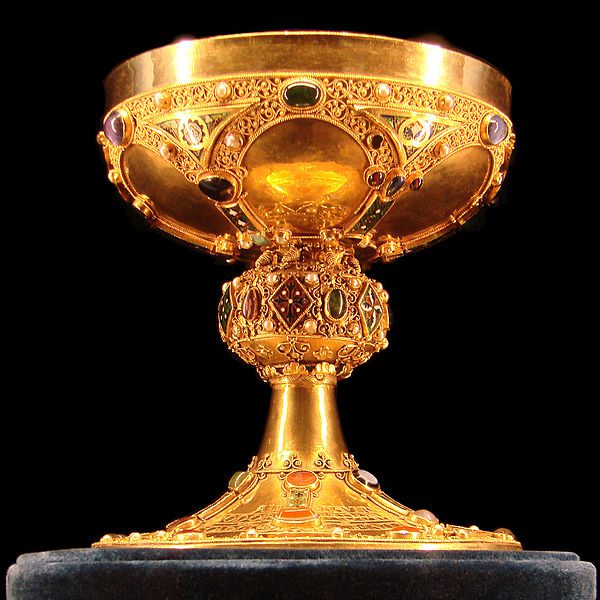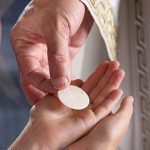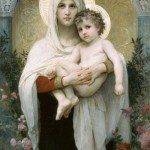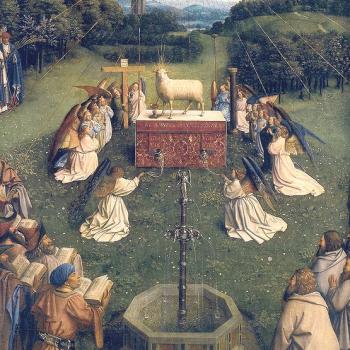Chalice from the Reims Cathedral, 12th century [public domain / Wikimedia Commons]***
Catholics have the option to often partake of the cup, but it is not always offered and not required (my own parish rarely offers it, if at all). The reason is that God (being God) cannot ever be divided. The “division” is only symbolic or conceptual (with the cup representing blood). The reality of transubstantiation, however, is that God is present Body, Blood, Soul, and Divinity in both what was formerly bread and formerly wine.
There is biblical indication of this:
1 Corinthians 11:27 Whoever, therefore, eats the bread or drinks the cup of the Lord in an unworthy manner will be guilty of profaning the body and blood of the Lord.
Note the bolded “or” and “and.” The way that Paul phrases this proves that he believes that the Body and Blood are present in both species. It’s all in the word “or”. The logic and grammar require it, so that the above can also be expressed in the following two propositions:
Whoever, therefore, eats the bread of the Lord in an unworthy manner will be guilty of profaning the body and blood of the Lord.
Whoever, therefore, drinks the cup of the Lord in an unworthy manner will be guilty of profaning the body and blood of the Lord.
* * * * *
Does the title of this post necessarily imply that I was arguing that this was the practice and norm in the early Church? No.
What I intended by the title and the post was to show that there is biblical rationale and indication of distribution of one species only, by virtue of the premise of Jesus being entirely present in either species having been taught by St. Paul.
Doctrines develop. We shouldn’t expect to see absolutely every jot and tittle of every doctrine and practice in Scripture. There is very little about, e.g., original sin or the Virgin Birth. Original sin isn’t even included in the Nicene Creed, and the Fathers talk far more about purgatory than original sin.
Other doctrines are only taught by deduction and indirect indication (such as the Two Natures of Christ). They aren’t laid out explicitly in Scripture. Infant baptism would be another example. It is the majority position of Christianity, but it isn’t explicitly laid out in Holy Scripture (though there is much implicit indication).
As one example of many that could be produced of implicit Scripture indication, how about Church buildings? As far as I know, these aren’t mentioned in the New Testament. The early Christians continued to worship at the Temple, and in their own homes. So why do we have our own church buildings when it is not a NT concept? Well (as in the present case) it is a straightforward deduction from what we know. One could argue it as follows:
Biblical Evidence for Church Buildings
1) The Jews, from whom Christianity derived, worshiped in synagogues.
2) The Jews, from whom Christianity derived, worshiped in the Temple.
3) The early Christians worshiped in their homes, and clandestinely in caves or catacombs, as the case may be.
4) These are not buildings expressly constructed for Christian worship.
5) However, it stands to reason (by analogy) that Christians, whose belief-system developed from Judaism, would also eventually (especially after official persecution ceased) have buildings of worship, just as the Jews did.
6) Therefore, deductively and analogically, the Bible sanctions Christian church buildings, and the “biblical evidence” for same is the above.
Also (replying to some comments in the lengthy discussion thread), if [many] Protestants are so big on a symbolic Eucharist only (a la Zwingli and the Anabaptists), and a bare remembrance, then they get that at every Mass, since the priest always consecrates both bread and wine.
In other words, if the thing is simply to meditate and remember (an abstract concept in one’s head), then anyone at Mass can do that during the consecration (when the priest raises the bread and the cup and they transform by the miracle of transubstantiation into the Body, Blood, Soul, and Divinity of our Lord Jesus Christ).
Follow the (erroneous) reasoning for a second: it’s only symbolic. We’re remembering only. It’s merely an abstract, non-physical thing, not concrete and real. Therefore, why does it matter if we partake of only one species? Why does it particularly matter at all if we receive anything, since it is only symbolic?
The mere ritual of drinking some grape juice (itself implemented only due to the temperance movement of the 19th century and not biblical at all, since wine was used in the biblical Eucharist) and taking some leavened bread (in the Bible it was unleavened in the Passover: the precursor to the Eucharist) does not make a thing any more real if it is only symbolic in the first place. One can just as well think about Jesus in their heads and receive the same spiritual benefit.
If a Protestant receives because he is commanded to, yet Jesus is not there, is this not an empty ritual, as opposed to Protestant spirituality as much as any of the many rituals of Catholicism that are so despised? What good is it if Jesus isn’t there? A sacrament conveys something real.
Perhaps this explains why the Eucharist is obviously of only secondary importance in much of Protestant worship (in Reformed circles it is often performed only once a month, or even quarterly). If it were so supremely important, then why wouldn’t it be every week? Instead, Protestants will place a mere sermon by a man in the place of central importance in their worship.
If they were so extremely concerned about being “biblical,” then they would have the Eucharist every time they met to worship, since that is what the Bible teaches us about what the early Christians did (Acts 20:7 and implied in 1 Corinthians 10:14-22).
So we see that [many] Protestants are quite unbiblical in many respects, with regard to the Eucharist:
1) They don’t receive the Eucharist every Sunday, as the Bible says early Christians did.
2) They don’t use wine, which is the biblical norm.
3) Many don’t use unleavened bread, which was the norm in the Passover, in the context of which Jesus instituted the Eucharist.
4) They don’t believe Jesus is substantially, physically present, as Jesus and Paul repeatedly taught (and the fathers, unanimously).
5) Thus, receiving Holy Communion becomes an empty ritual of the sort that is routinely condemned in Catholicism, since Jesus isn’t there in the first place, and the ritual has become devoid of all meaning and power. If someone wants to meditate on Jesus’ death, they can do it anywhere and at any time. Why go to church to do it?
6) Protestants (in non-eucharistic services) place the mere homilies of a man (often centered on unbiblical traditions of men, to the extent that various false doctrines of Protestantism are promulgated) in the central place in the worship service, rather than Jesus Christ coming to us in the Holy Eucharist. And they claim that we are so man-centered?
7) Some Protestants are so unsacramental and unbiblical that they do not believe in either the Eucharist or baptism (e.g., Salvation Army and Quakers).
I hasten to note that there are also Protestants who celebrate the Eucharist every week: e.g., Lutherans and Anglicans.
Eucharistic or Proto-Eucharistic Examples of “Bread” Only
***
Matthew 14:19-21 (RSV) Then he ordered the crowds to sit down on the grass; and taking the five loaves and the two fish he looked up to heaven, and blessed, and broke and gave the loaves to the disciples, and the disciples gave them to the crowds. [20] And they all ate and were satisfied. And they took up twelve baskets full of the broken pieces left over. [21] And those who ate were about five thousand men, besides women and children. (cf. Mk 6:41-44; Lk 9:13-17)
Luke 24:30-31, 35 When he was at table with them, he took the bread and blessed, and broke it, and gave it to them. [31] And their eyes were opened and they recognized him; and he vanished out of their sight.. . . [35] Then they told what had happened on the road, and how he was known to them in the breaking of the bread. (cf. Acts 2:42; 20:7; 27:35)
John 6:11-12 Jesus then took the loaves, and when he had given thanks, he distributed them to those who were seated; so also the fish, as much as they wanted. [12] And when they had eaten their fill, he told his disciples, “Gather up the fragments left over, that nothing may be lost.”
John 6:27 Do not labor for the food which perishes, but for the food which endures to eternal life, which the Son of man will give to you; for on him has God the Father set his seal.
John 6:31-35 Our fathers ate the manna in the wilderness; as it is written, `He gave them bread from heaven to eat.’“ [32] Jesus then said to them, “Truly, truly, I say to you, it was not Moses who gave you the bread from heaven; my Father gives you the true bread from heaven. [33] For the bread of God is that which comes down from heaven, and gives life to the world.” [34] They said to him, “Lord, give us this bread always.” [35] Jesus said to them, “I am the bread of life; he who comes to me shall not hunger, and he who believes in me shall never thirst.
John 6:48-51 I am the bread of life. [49] Your fathers ate the manna in the wilderness, and they died. [50] This is the bread which comes down from heaven, that a man may eat of it and not die. [51] I am the living bread which came down from heaven; if any one eats of this bread, he will live for ever; and the bread which I shall give for the life of the world is my flesh.”
John 6:57-58 As the living Father sent me, and I live because of the Father, so he who eats me will live because of me. [58] This is the bread which came down from heaven, not such as the fathers ate and died; he who eats this bread will live for ever.”
[John 6 is very interesting in this regard, insofar as it gives examples of both flesh and blood being partaken of (6:53-56), yet only body / flesh is spoken of singularly and repeatedly as giving spiritual life, and Jesus never describes Himself as the “living wine” from heaven. Hence, the analogy directly holds to Catholic communion without both species, where consecrated hosts only are distributed. The full eucharistic doctrine comes together in 1 Corinthians 11:27, where Paul’s careful use of “or” and “and” prove that the entire Jesus: Body, Blood, Soul, and Divinity, as Catholics say, is contained in each species (see previous related paper above). In any event, both the biblical and Catholic models allow for distribution of both species, or one only (usually consecrated hosts)]
Eucharistic Types or Shadows: Examples of “Bread” or Flesh (Minus Blood) Only
***
Exodus 25:30 And you shall set the bread of the Presence [KJV: “shewbread”] on the table before me always. (cf. 35:13; 39:36)
Leviticus 14:25 And he shall kill the lamb of the guilt offering; and the priest shall take some of the blood of the guilt offering, and put it on the tip of the right ear of him who is to be cleansed, and on the thumb of his right hand, and on the great toe of his right foot.
[the Jews separated the blood from meat to be eaten, and were forbidden to partake of blood: Gen 9:4; Lev 3:17; 7:26-27; 17:10-14; 19:26; . Therefore, the paschal lamb and bulls sacrificed : prototypes of Jesus’ sacrifice on the cross, and of the Eucharist (since they were eaten and since the Last Supper, where the Holy Eucharist was instituted, was a Passover meal), were “meat only” with no blood]
Deuteronomy 8:3 And he humbled you and let you hunger and fed you with manna, which you did not know, nor did your fathers know; that he might make you know that man does not live by bread alone, but that man lives by everything that proceeds out of the mouth of the LORD. (cf. Num 11:7-9; Ps 78:24-29)
1 Samuel 21:6 So the priest gave him the holy bread; for there was no bread there but the bread of the Presence, which is removed from before the LORD, to be replaced by hot bread on the day it is taken away.
1 Kings 7:48 So Solomon made all the vessels that were in the house of the LORD: the golden altar, the golden table for the bread of the Presence,
1 Chronicles 9:32 Also some of their kinsmen of the Ko’hathites had charge of the showbread, to prepare it every sabbath. (cf. 23:29; 28:16)
2 Chronicles 2:4 Behold, I am about to build a house for the name of the LORD my God and dedicate it to him for the burning of incense of sweet spices before him, and for the continual offering of the showbread, and for burnt offerings morning and evening, on the sabbaths and the new moons and the appointed feasts of the LORD our God, as ordained for ever for Israel. (cf. 4:19; 13:11; 29:18; Neh 10:33)
2 Chronicles 29:22 So they killed the bulls, and the priests received the blood and threw it against the altar; and they killed the rams and their blood was thrown against the altar; and they killed the lambs and their blood was thrown against the altar.
2 Chronicles 35:11 And they killed the passover lamb, and the priests sprinkled the blood which they received. . .
Matthew 12:3-4 He said to them, “Have you not read what David did, when he was hungry, and those who were with him: [4] how he entered the house of God and ate the bread of the Presence, which it was not lawful for him to eat nor for those who were with him, but only for the priests? (cf. Mk 2:26; Lk 6:4)
John 1:29, 36 The next day he saw Jesus coming toward him, and said, “Behold, the Lamb of God, who takes away the sin of the world! . . . and he looked at Jesus as he walked, and said, “Behold, the Lamb of God!”
1 Corinthians 5:7 Cleanse out the old leaven that you may be a new lump, as you really are unleavened. For Christ, our paschal lamb, has been sacrificed.
Hebrews 9:2-4 For a tent was prepared, the outer one, in which were the lampstand and the table and the bread of the Presence; it is called the Holy Place. [3] Behind the second curtain stood a tent called the Holy of Holies, [4] having the golden altar of incense and the ark of the covenant covered on all sides with gold, which contained a golden urn holding the manna, and Aaron’s rod that budded, and the tables of the covenant;
Revelation 2:17 He who has an ear, let him hear what the Spirit says to the churches. To him who conquers I will give some of the hidden manna,. . .
Revelation 5:6 And between the throne and the four living creatures and among the elders, I saw a Lamb standing, as though it had been slain,. . . (cf. 5:8, 12-13; 6:1, 16; 7:9-10, 14, 17; 8:1; 12:11; 13:8, etc.)
***
Stay in touch! Like Biblical Evidence for Catholicism on Facebook:













